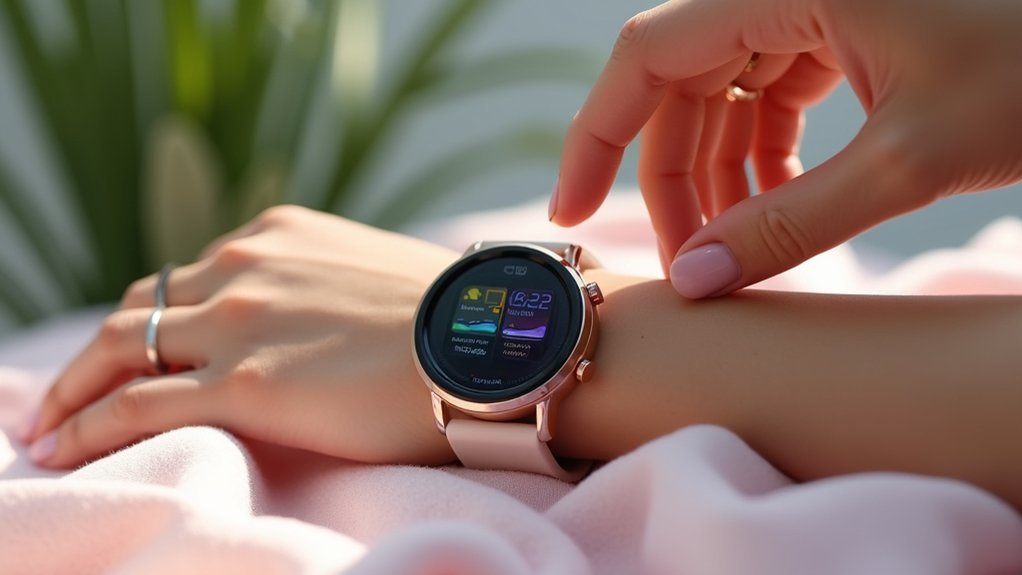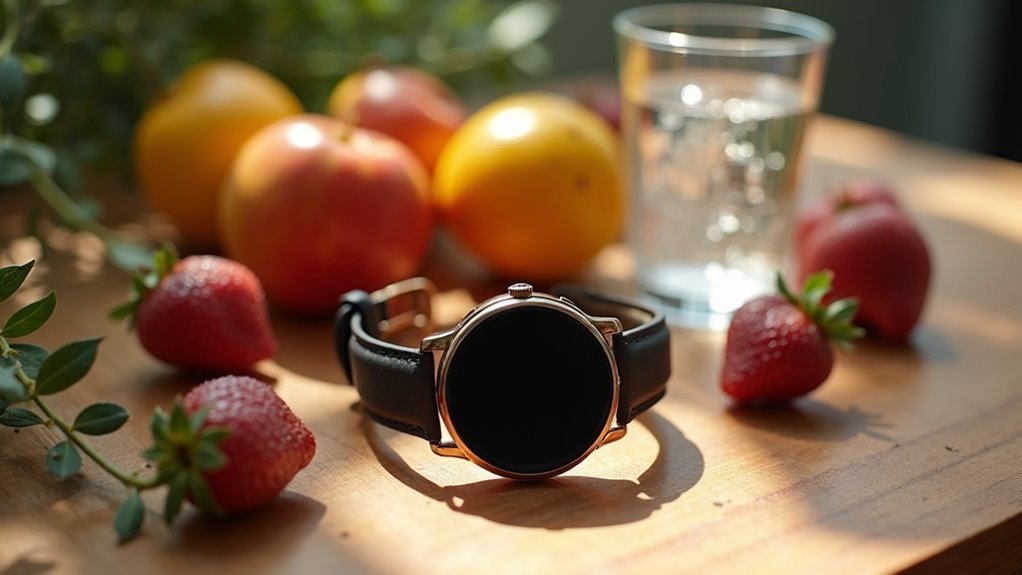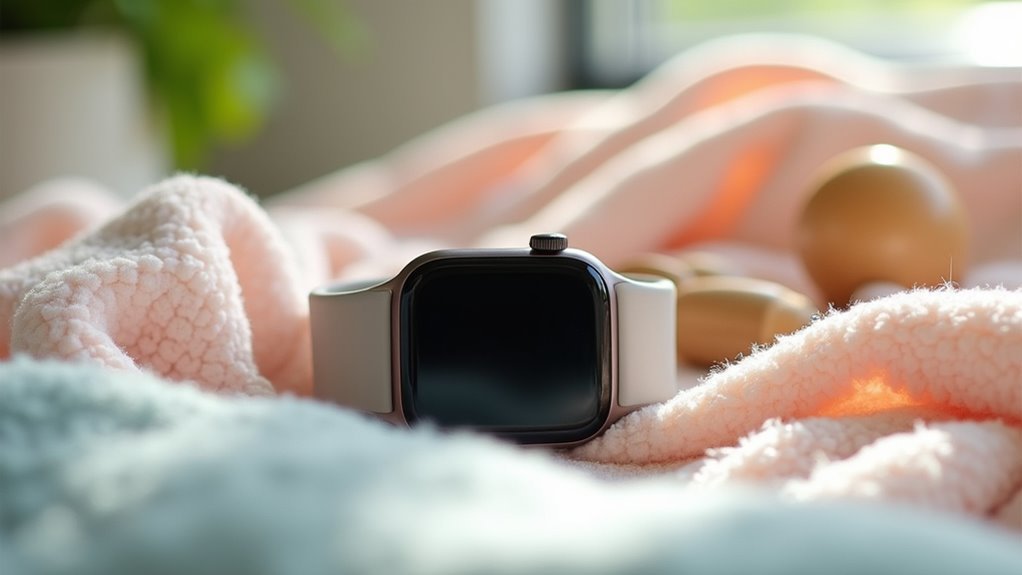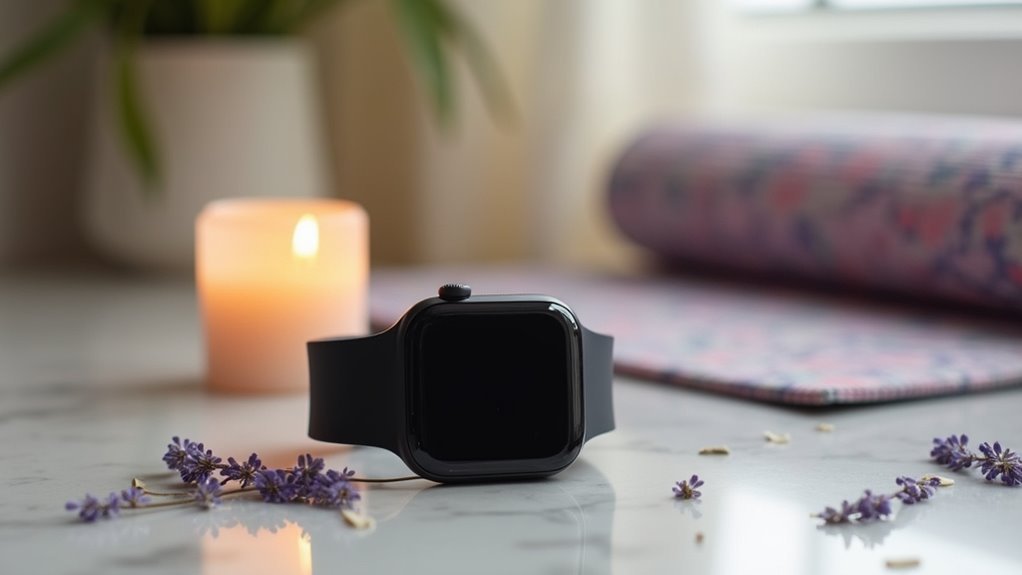You’ll master women’s health smartwatch tracking through AI-powered features that monitor menstrual cycles, ovulation patterns, and hormonal fluctuations with personalized insights based on over 450 research studies. These devices track sleep quality, stress levels, and provide breathing exercises tailored to your cycle phases. Advanced models predict periods up to six days early using temperature sensors, while offering hydration reminders and pregnancy monitoring capabilities. Exploring these sophisticated wellness tools will reveal extensive health management possibilities.
AI-Powered Personalized Health Insights for Women
The partnership between Zepp Health and Wild.AI has revolutionized women’s health tracking by integrating a thorough wellness app directly onto Amazfit smartwatches.
You’ll access hormone, symptom, and biometric statistics straight from your wrist without needing your phone. This AI-powered solution delivers personalized readiness scores and training plans tailored specifically for women’s health needs across all life stages.
The AI leverages research from over 450 whitepapers to provide exercise and diet recommendations that adapt to your menstrual and hormonal cycles.
AI-driven recommendations backed by 450+ research papers adapt seamlessly to your unique hormonal and menstrual cycle patterns.
You’ll receive dynamic advice spanning physical activity, nutrition, and recovery plans based on your fluctuating hormone levels. The integration addresses critical gaps in health technology, as 80% of medical research has traditionally centered on males rather than female physiology.
Complex health data patterns are simplified into actionable insights, transforming confusing metrics into straightforward guidance that helps you optimize wellness and training effectiveness.
Menstrual Cycle and Ovulation Tracking Technology
Modern smartwatches leverage sophisticated sensor technology to monitor your menstrual cycle and ovulation patterns through continuous physiological tracking.
These devices measure skin temperature fluctuations and heart rate changes during sleep, providing more accurate readings than daytime measurements since they’re less affected by external factors.
Your smartwatch breaks down your cycle into four distinct phases:
- Menstruation – Active bleeding period tracking
- Follicular – Pre-ovulation hormone monitoring
- Ovulation – Fertile window identification
- Luteal – Post-ovulation phase analysis
Advanced devices like the Oura Ring can predict your period six days in advance by analyzing temperature patterns. Quality devices provide insights on balancing activity and recovery throughout different cycle phases to optimize your health monitoring experience.
Emerging technologies include internal sensors for core body temperature monitoring, offering superior accuracy compared to skin-based measurements.
You’ll receive predictive notifications about upcoming periods and fertile windows based on your historical data.
Advanced Sleep Quality and Stress Management Features
Your smartwatch’s sleep apnea detection technology uses advanced sensors to monitor breathing interruptions that could signal serious health concerns requiring medical attention.
You’ll benefit from continuous heart rate monitoring that tracks variations throughout your sleep cycles, providing insights into your overall cardiovascular health and recovery patterns.
The AI-guided stress relief features analyze your biometric data to recommend personalized breathing exercises and relaxation techniques when elevated stress levels are detected. Advanced devices now track wrist temperature, heart rate, and respiratory rate simultaneously to provide comprehensive sleep quality assessments that help identify potential health issues before they become serious concerns.
Sleep Apnea Detection Technology
While traditional sleep studies require overnight hospital visits, today’s smartwatches can detect potential sleep apnea right from your wrist with remarkable accuracy.
New-generation devices achieve 75-96% accuracy in identifying OSA cases, with FDA-approved models like Apple Watch 9, 10, Ultra 2, and Samsung Galaxy Watch 7 leading the charge.
Your smartwatch uses multiple sensors to detect breathing interruptions:
- Blood oxygen sensors measure SpO2 fluctuations during sleep episodes
- Accelerometers track subtle wrist movements linked to breathing disruptions
- Microphones detect snoring patterns associated with apnea events
Machine learning algorithms analyze this multi-sensory data to provide early warning signs that encourage professional evaluation.
While they can’t replace clinical diagnosis, these devices serve as valuable screening tools that help you identify potential sleep disorders before they impact your long-term health. Approximately 80% remain undiagnosed with sleep apnea, making wearable detection technology particularly valuable for early intervention.
Continuous Heart Rate Monitoring
Beyond detecting breathing disruptions during sleep, smartwatches equipped with photoplethysmography (PPG) sensors deliver extensive 24/7 heart rate monitoring that transforms how you track sleep quality and manage daily stress.
These advanced multi-path sensors detect subtle heart rhythm changes, providing early alerts for conditions like atrial fibrillation while supporting personalized fitness insights.
Your heart rate variability (HRV) data reveals restorative sleep phases, enabling detailed sleep stage tracking through light, deep, and REM analysis.
AI-powered sleep coaching uses this information to improve your rest patterns naturally.
For stress management, continuous monitoring feeds real-time data into guided breathing exercises when elevated heart rates indicate stress peaks. A low resting heart rate is associated with health and longevity, making continuous tracking valuable for overall wellness assessment.
Multi-sensor integration including skin temperature enhances accuracy, while stress scores help you track long-term mental well-being trends for informed lifestyle adjustments.
AI-Guided Stress Relief
When stress levels spike throughout your day, AI-powered smartwatch algorithms instantly analyze your heart rate variability, skin temperature, and movement patterns to trigger personalized stress relief interventions.
Your device doesn’t just detect stress—it actively helps you manage it through tailored solutions.
These smart features work together to create extensive stress management:
- Real-time breathing exercises guide you through personalized relaxation techniques when elevated stress is detected.
- Mindfulness notifications prompt meditation sessions based on your stress patterns and daily schedule.
- Progressive tracking monitors your stress management improvement over time, adjusting recommendations accordingly.
You’ll receive immediate alerts when stress levels climb, giving you the chance to take proactive steps.
The AI learns your unique stress triggers and responses, continuously refining its approach to deliver increasingly effective personalized interventions. Beyond stress management, these advanced algorithms also provide personalized health summaries that help you understand how stress impacts your overall wellness patterns.
Non-Invasive Blood Glucose Monitoring Capabilities
Although the promise of checking your blood sugar levels with a simple glance at your smartwatch sounds revolutionary, the reality remains far more complex. Currently, no smartwatch has received FDA approval for glucose monitoring, making this feature unavailable in legitimate health tracking devices.
Several technologies are being explored, including optical methods using infrared light, microwave transmission through skin, and electromagnetic stimulation to detect glucose reactions. However, these face significant challenges from skin interference and signal noise that compromise accuracy.
If you’re managing diabetes, don’t rely on unapproved devices available online—their reliability varies drastically. Clinical studies have shown some devices meeting accuracy requirements only 18% to 84% of the time.
While researchers are developing enhanced signal quality systems and improved photodetectors, you’ll need to continue using traditional monitoring methods until these technologies receive proper clinical validation and regulatory approval.
Smart Hydration and Nutrition Reminder Systems
Your smartwatch can transform from a simple fitness tracker into a personalized health coach that knows exactly when you need to hydrate and refuel.
These devices analyze your sweat composition, workout intensity, and daily activity patterns to send targeted reminders for both fluid intake and ideal meal timing.
You’ll receive real-time alerts that specify whether you need electrolytes after an intense session or a protein snack to support recovery, eliminating the guesswork from your wellness routine. Since thirst often indicates dehydration has already begun, these proactive monitoring systems help you stay ahead of your body’s hydration needs before symptoms appear.
Personalized Hydration Alerts
Modern women’s health smartwatches revolutionize hydration management by delivering personalized alerts that adapt to your unique fluid and electrolyte loss patterns throughout the day.
These devices use optical sensors and sweat-analysis technology to continuously monitor your hydration status, providing real-time drinking recommendations through your watch or smartphone app.
Key benefits of personalized hydration alerts include:
- Customized timing – Alerts sync with your daily schedule and activities for convenient reminders
- Health integration – Hydration tracking combines with heart rate, sleep, and stress monitoring for thorough wellness management
- Performance enhancement – Prevents dehydration during exercise while supporting energy levels and cognitive function
Your device’s companion app coaches you on proper hydration quantities and electrolyte needs, ensuring you maintain ideal fluid balance for better overall health outcomes. These comprehensive wellness insights encourage healthy habits that support both immediate hydration needs and long-term fitness goals.
Smart Nutrition Timing
Beyond keeping you hydrated, today’s women’s health smartwatches excel at enhancing your nutrition timing through intelligent reminder systems that sync with your body’s natural rhythms and activity patterns.
These devices track your circadian rhythms to suggest ideal eating times, helping you maintain consistent energy levels throughout the day. You’ll receive personalized alerts for post-workout nutrition to support recovery, plus reminders for balanced meals when your intake appears lacking in essential nutrients. Advanced models from brands like Apple and Garmin provide comprehensive health insights that extend beyond basic activity tracking to optimize your nutritional wellness.
Your smartwatch can recommend meal timing based on your energy peaks and activity schedule, ensuring you’re properly fueled for workouts and daily demands.
Pregnancy and Hormonal Health Monitoring Tools
While traditional pregnancy tracking relied on paper journals and sporadic doctor visits, smartwatches have revolutionized how you can monitor your pregnancy and hormonal health in real-time.
Smartwatches have transformed pregnancy monitoring from paper journals to real-time health tracking on your wrist.
These devices offer extensive tools that track everything from baby movements to blood glucose levels directly on your wrist.
Modern smartwatches provide three essential pregnancy monitoring capabilities:
- Weekly Progress Updates – Track your baby’s size, gestational age, and developmental milestones through specialized apps like Garmin Connect™.
- Symptom Logging – Record physical symptoms, mood changes, and baby movements for holistic pregnancy monitoring.
- Health Alerts – Receive notifications for high heart rate, walking steadiness issues, and mental health check-ins.
You’ll also benefit from pregnancy-specific educational content, nutritional guidance, and seamless data sharing with healthcare providers for enhanced prenatal care. These comprehensive features require JavaScript enabled for full functionality and optimal user experience.
Top Smartwatch Models Designed for Women’s Health Needs
When you’re searching for a smartwatch that truly understands women’s health needs, you’ll find that certain models stand out with features specifically designed for female wellness.
The Fitbit Versa 4 combines extensive fitness tracking with a sleek, feminine design that appeals to style-conscious users.
Garmin’s Venu 3S offers advanced health monitoring in a smaller case size that fits comfortably on smaller wrists.
Apple Watch Series 10 provides the most extensive health ecosystem, seamlessly integrating with health apps for complete wellness tracking.
Samsung Galaxy Watch Ultra delivers robust AI-driven insights that help you understand complex health data.
For budget-conscious buyers, the Fitbit Inspire 3 offers essential health tracking without compromising quality. Many of these smartwatches provide impressive battery life that can last throughout your daily routine and fitness activities.
Each model features interchangeable bands and customizable displays to match your personal style.
Frequently Asked Questions
How Accurate Are Smartwatch Health Measurements Compared to Medical Devices?
You’ll find smartwatch measurements moderately accurate but inconsistent compared to medical devices. Heart rate shows 3-20% error, blood pressure has systematic bias, while step counting and oxygen saturation remain reasonably reliable for general monitoring.
Can I Wear My Smartwatch While Swimming or Showering?
You can wear your smartwatch while swimming or showering if it’s rated 5 ATM or higher. Check your manufacturer’s guidelines, as soap and hot water may degrade seals over time.
How Long Does the Battery Last With Continuous Health Monitoring Enabled?
Battery life with continuous health monitoring varies considerably across smartwatches. You’ll get up to 2 days with Samsung Galaxy Watch 7, while Amazfit Balance lasts 14 days, and Fitbit Charge 6 provides 7 days.
Will My Health Data Remain Private and Secure From Third Parties?
Your health data’s privacy isn’t guaranteed. Companies can share information with third parties, and current laws don’t fully protect smartwatch data. You’ll need to rely on manufacturer policies and carefully review privacy settings.
Do I Need a Smartphone to Use All Smartwatch Health Features?
You don’t need a smartphone for basic health tracking like heart rate and sleep monitoring. However, you’ll need one for advanced features like detailed data analysis, app management, notifications, and syncing with health apps.





Leave a Reply